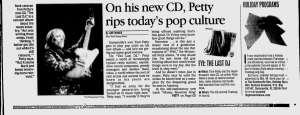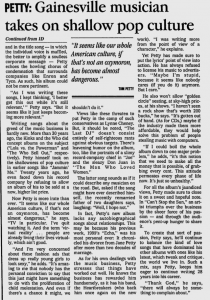On his new CD, Petty rips today's pop culture
By Jim Farber
Gainesville Sun - October 9, 2002
Gainesville's own Tom Petty gets to play pop critic on his new album -- and he's not giving out many good reviews.
On "The Last DJ," Petty paints a world of increasingly cynical radio stations, exploitive record companies, greedy managers and shallow musicians, a world where the sort of real artists and earnest fans he knew in his youth are marginalized.
"I feel so sorry for the younger generation being turned on to music now," Petty says. "I wonder if they're being offered anything that's that good. Or if they even know how good things can be."
Hmmmm ... is this just a classic case of a generation complaining about the one that replaces it? "Well," the 48-year-old Petty allows, "it may sound like I'm just some old guy bitching about how much better things were in my day. But the truth is, they were."
And he doesn't mean just in music. Petty says he used the milieu he knows best as a metaphor for the deepening greed he sees in America.
In the self-explanatory new track "Money Becomes King" and in the title song -- in which the individual voice is muffled, the better to amplify a soulless corporate message -- Petty echoes the howling chorus of condemnation that surrounds companies like Enron and Tyco. As such, his album could not be more pertinent.
"As I was writing these songs, I kept thinking, 'I better get this out while it's still relevant,'" Petty says. "But it seems like it just keeps becoming more relevant."
Writing songs about the greed of the music business is hardly new. More than 30 years ago, the Kinks and the Who did concept albums on the subject ("Lola vs. the Powerman" and "The Who Sell Out," respectively). Petty himself took on the shallowness of pop culture in earlier songs like "Jammin' Me." Twenty years ago, he even faced down his record company by refusing to allow an album of his to be sold at a new, higher list price.
Now Petty is more irate than ever. "It seems out whole American culture, if that's not an oxymoron, has become almost dangerous, he says. "TV in particular. I've quite watching it. And the term 'virtual reality' ... people are already living their lives virtually, which ain't good.
"And I'm very concerned about these fashion ads that dress up really young girls to look sexy," he adds. "It's amazing to me that nobody has the personal conviction to say that this might have something to do with the proliferation of child molestation. And even if there's a chance it might, we shouldn't do it."
Views like these threaten to put Petty in the camp of such conservatives as Lynne Cheney. But it should be noted, "The Last DJ" doesn't consist entirely of self-righteous rants against obvious targets. There's leavening humor on the album, too, like the portraits of a slimy record-company chief in "Joe" and the sleazy Don Juan in "The Man Who Loved Women."
The latter song sounds as if it could describe any musician on the road. But, asked if the song might have ever described himself, the recently remarried father of two daughters says, laughing: "Well, I hope not."
In fact, Petty's new album lacks any autobiographical songs about relationships. This may be because his previous work, 1999's "Echo," was his most personal ever: It chronicled his divorce from Jane Petty after more than two decades of marriage.
As for his own dealings with the music business, Petty stresses that things have worked out well. He knows the business has rewarded him handsomely, as it has his band, the Heartbreakers (who back him once again on the new work). "I was writing more from the point of view of a character," he explains.
Yet Petty has made sure to put the lyrics' point of view into action. He has always refused to license his music to advertisers. "Maybe I'm stupid, because it seems like nobody cares (if you do it) anymore. But I care."
He also won't allow "golden circle" seating, at sky-high prices, at his shows. "I haven't seen a rock show that's worth 200 bucks," he says. "It's gotten out of hand. (As for CDs,) maybe if the industry made them more affordable, they would help solve this problem of people stealing music with computers.
"If I could boil the whole album down to one major problem," he adds,"it's this notion that we need to make all the money that is possible, of grabbing every cent. This attitude permeates every phase of life now. It's just so unhealthy."
For all the album's jaundiced views, Petty made sure to close it on a sweet and hopeful note. In "Can't Stop the Sun," an artist triumphs over the business by the sheer force of his passion -- and through the audience's pent-up hunger to share it.
To create that sort of passion, Petty says, he'll continue to balance the kind of love songs that have dominated his other albums with ones like his latest, which tweak and critique the world we live in. Such a mix, says Petty, keeps him eager to continue writing 28 years into his career.
"Thank God," he says, "there will always be something to complain about."


